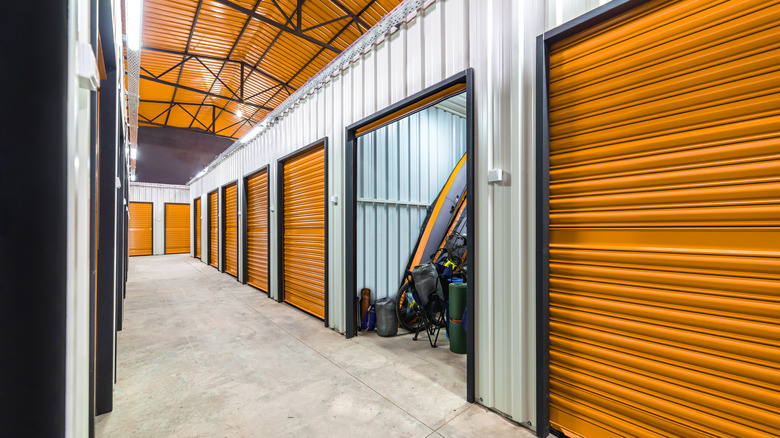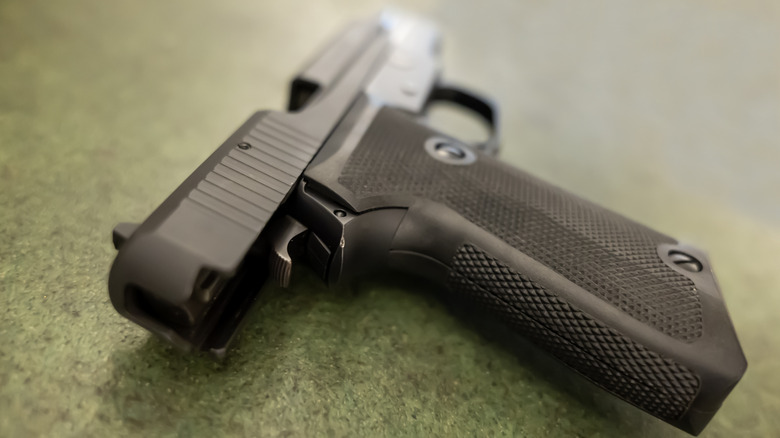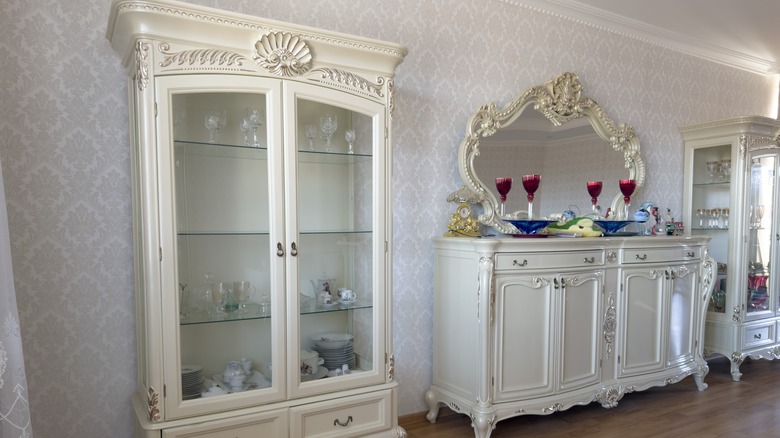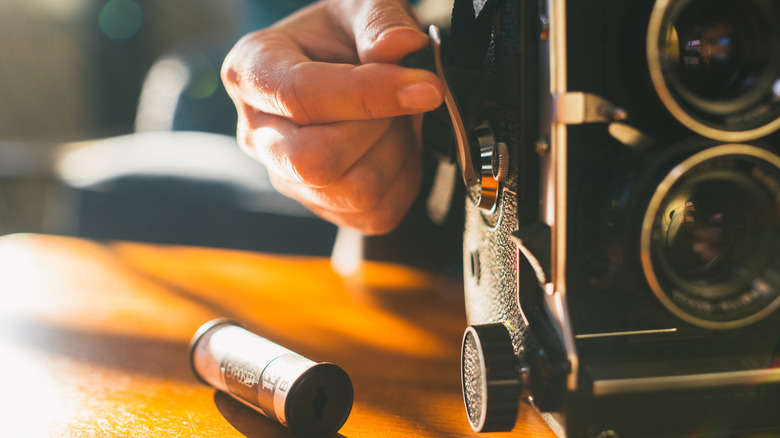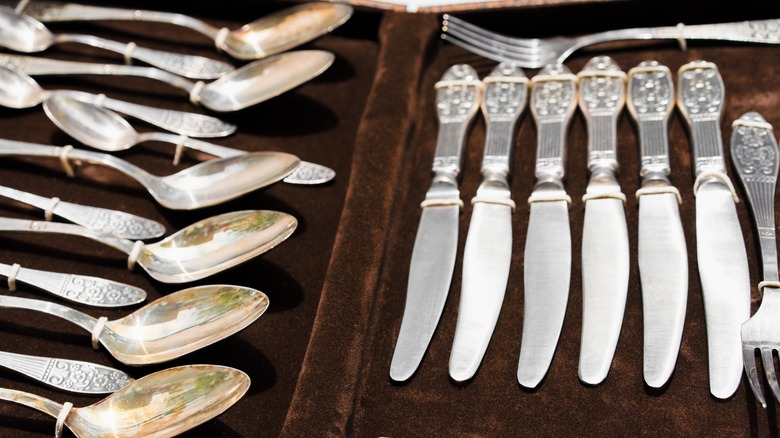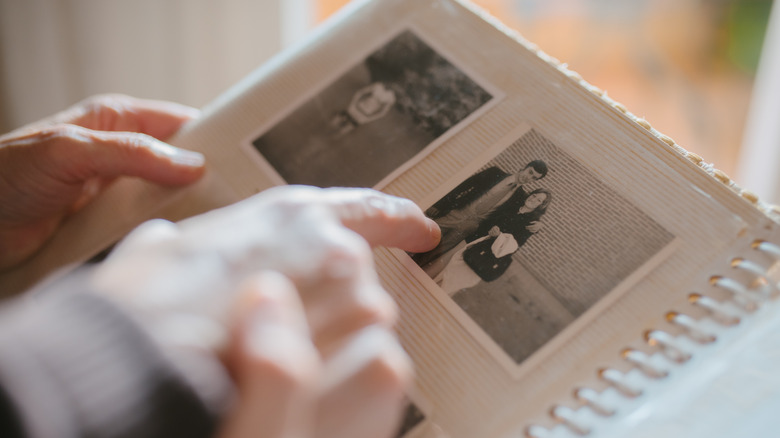Inheriting These Assets From A Relative Is Really A Curse In Diguise
Inheritance is a tangled web of challenges and bittersweet triumphs. Many parents (and other loved ones) seek to leave something behind for their family members. It might be the home you grew up in or a portfolio of stock market assets that had been supporting the retirement lifestyle of the cherished departed. Inheriting cash and other valuable belongings can transform a person's life in an instant. The sudden ownership of a new home—or even a portion of the property's value split between siblings—can be a massive financial windfall. But there's something else to grapple with; losing a parent or family member is always hard, and the newly-acquired financial mobility certainly comes with a few emotional strings attached.
The pain that may come into view while preparing a family member's home or other assets for sale is just one aspect of the sticky situation that some inheritors can find themselves in, though. In reality, there are many assets that you can inherit from a loved one that are actually of a curse rather than a positive, life-altering bequeathment. Whether it's a financially valuable belonging with complicating factors attached or a non-financial asset that requires special and sometimes exacting handling, there are unfortunately a great many things that parents and others can leave behind that challenge their inheritors. These are some of the most fraught assets you can be listed to take ownership of when a loved one passes, as well as a few potential resolution options to help get through the process.
Real estate properties
One of the most common things that people leave to their children is their home. There are all sorts of valuable assets that a person might own throughout the course of their lifetime that they eventually might sell. Seniors don't always require a car as they continue to age, for example. But everyone needs a place to live, and this necessity frequently means that older Americans continue to maintain ownership of their home, even if they move into a retirement community or begin living with an adult child. It's fairly common to inherit a home from your parents, and with the housing market continuing to be so contentious for buyers, this can seem like a major value infusion. But the reality is that inheriting a property is typically far more complicated than you might expect.
One of the main problems inherent to houses owned by Baby Boomers today is a mismatch in lifestyle requirements between older inhabitants and younger ones that will come after them. Whether you're considering selling the property or moving into it yourself, there is often plenty of work to do in bringing an older person's home up to the lifestyle and feature inclusions that are expected in a modern home today. In order to sell or rent the property, you may be required to pour plenty of additional cash into retrofitting the space. If you plan on living in the home, you'll either have to spend money to renovate the property or live with the shortcomings for a time. All this says nothing about potential conflict among siblings who may not want the same thing, adding yet another wrinkle to consider.
A storage unit
Getting rid of your storage unit is something that all older people should consider as they enter and continue progressing through their retirement years. A storage unit is a costly additional space that frequently doesn't deliver the value you might anticipate. Storage space tends to just end up as a dumping ground for things you no longer want in your home but haven't decided to completely cut out of your life. They also feature as safe keeping spaces for important documents, valuable heirlooms and collectibles, and more.
The result is a tangled web of personal belongings that require an inheritor to either give up on them entirely or sift through meticulously as they settle their loved one's estate. Storage units often blend items that might be considered junk or disposable with true gems that represent the life and spirit of the person who has passed. This means that many adult children will have to sort through belongings found here in their entirety so that they can sell or toss items that no longer hold value and keep possessions that are financially useful or maintain sentimental meeting. This process will almost certainly be time consuming and frustrating, with mixed results coming at the end of it all.
Guns
Guns can be a real mess to inherit. This asset isn't like most other goods because a gun must be registered in order to be legally possessed. Depending on the state you live in, there can be a convoluted set of rules and regulations that dictate how the transference of ownership should take place. You may have to get police officers to come to your home to collect the weapon and store it during the probate period. Moreover, this process becomes even messier if the weapon will eventually cross state lines in order to come home with you.
The registration process when buying a gun for yourself can be lengthy and demanding, and it only gets more complicated when dealing with a weapon as an inheritance. This is because the person passing on the firearm is no longer around to make sense of documentation or rectify any issues that may exist. A gun that was improperly registered to begin with may not be eligible for a transfer of ownership at all, and numerous other sticking points can arise during this handover. Therefore, if you are an avid gun collector and want to leave your firearms to loved ones as part of your estate, speaking with them before you pass and making plans to transfer ownership ahead of this uncertain time will be the most advantageous approach.
Family businesses
Many people across the country have started businesses and grown them into great successes. Whether you are part of a local family business that offers a service to your community or a large-scale operation with complex eCommerce channels and trade across jurisdictions, the urge to continue that work under the direction of a new generation within the family can be a strong one. Family businesses can be an immense source of wealth for a household, and in many cases a parent that launched the business will employ their children, working side by side for years or even decades.
The problem with family businesses is an uncertainty in the line of management succession. Unlike cash savings accounts, stock market assets, or real estate properties, businesses are exceedingly difficult to carve up during probate. If one member of a family doesn't want to sell the home while the rest do, it's entirely possible to take out a loan to pay off other inheritors and keep the property, for example. But a business operates more as an all or nothing entity. Family members can't typically spin off certain assets, and finding the capital to pay off some inheritors while others remain in the fold can be tricky or even impossible. The best way to manage this kind of asset in an inheritance is for the owner to name a successor directly and to work with family members in order to spell out desires and a coherent plan for the company's future.
A timeshare
Timeshares are some of the worst investments you can make, period. With that being said, certain people may find that buying into a timeshare provides them with exactly what they're looking for (and buying one "second hand" offers a great discount over a new contract). In many instances, timeshares impose restrictions on when owners can use the property, and there's the maintenance and upkeep fees that continue to follow an owner throughout their journey. Even so, a timeshare might be ideal under specific conditions where a buyer has found a particular place they like to go on vacation and might not have many restrictions on personal time that works to get away. For most however, timeshares are a bigger burden than they are an asset. There's a reason why the timeshare trope exists in the first place after all.
Where timeshares become exceedingly problematic is in the transfer of ownership during an inheritance. It might seem like a good idea to hand over this vacation ownership share to a loved one, but the reality is that timeshares don't typically fit the needs and availability requirements of most people. To make matters worse, contracts usually include sticky language that makes it hard to get out of the obligation once you've taken it on. Leaving one of these assets to a loved one can ultimately find them on the hook to continue paying annual fees long into the future without the ability to actually take advantage of the rental property. If you have been made the beneficiary of the timeshare, you have the option of declining this portion of your inheritance (and probably should).
Large, antique furniture
Antiques have their place in just about any household. Antique furniture occupies a special place in many homes and in the case of items that have been handed down through generations, they can be a fantastic asset to give to loved ones as a part of their inheritance. But not all antique pieces of furniture share these special properties. Some pieces may be broken or have started to establish rot or other problems in their build. Others are simply too large to incorporate into a new household. Then there's the reality that a person looking to pass on valuable items like this may not have an equal distribution of goods to share around to all of their special loved ones. This can cause friction among family members. Those who end up with particularly large pieces of furniture might also have significant difficulties in transporting and storing them.
These items might not fit in an inheritor's home even if they aren't particularly overwhelming examples. This can leave a beneficiary with a difficult decision to make. An antique with a lengthy family history might be one that feels like it should be kept. However, this can require an expensive storage unit to maintain while selling the piece in order to get it off your hands and get some cash back can feel like the wrong decision for emotional reasons. There's often no ideal way to deal with bulky pieces of furniture, as a result.
A big library of books
Lots of people collect books as a sort of byproduct of typical life. People read all kinds of titles on a regular basis and often invest in books on required reading lists for collegiate education or even writings that may help improve job performance in the office. There are countless reasons to add books to your home, and because it's so easy to just throw a title on the shelf once you're finished with it, many homeowners and renters end up with a considerable library of books they are no longer actively using.
Selling your books before you retire is frequently a great idea, especially if you're planning a move that involves downsizing or a shift to a new city that might support no state income tax on your Social Security benefits or other financial or lifestyle improvements. Those who haven't shed reading materials from their home will frequently leave a potentially substantial task for their loved ones. As is the case with many other collections you might come across as an inheritor, many of the books on your loved one's shelves won't be financially or sentimentally valuable. They also may not include a wealth of titles that you might want to keep for entertainment or reference purposes, either. Leaving behind lots of books ultimately turns into a task that's a hassle to manage rather than a valuable portion of an inheritance.
Collectibles
Everyone will have their own unique collection of valuable items, and every collection within a niche will have its own stand out pieces and fluff. Lots of people collect things like valuable records and sports cards. There are lots of collections worth a pretty penny sitting in older people's storage units, attics, or garages. Sorting through a collection can be time consuming and require plenty of effort. Leaving the task of organizing a prized collection to someone else is just one reason to reconsider including a collection in an inheritance rather than selling it or gifting it before moving on.
Another issue with inheriting collectibles is the tax liability. Generally speaking, selling a collectible item you've inherited can incur a tax liability up to 28% and the longer you own the asset the more damaging your overall tax burden can become. These assets are assessed on a step-up in basis tax liability. This means that the cost basis of the item is assessed as its value from the time of the original owner's death. Assets that tend to appreciate in value over time will therefore cost an inheritor more with each passing year as they hold the collectible item in an attempt to increase its value. Inheriting a collection can be a nice way to remember your loved one. But as a strategic financial asset, taking possession of this kind of item after a person's death can often introduce many complications.
Exercise equipment
Exercise equipment in an elderly person's home may be outdated or particularly well-used. Lots of people purchase exercise equipment in order to stay in shape and then keep the same gear for many years. Unlike phones or computers, a treadmill really doesn't need to be replaced when a new model is released. Moreover, exercise equipment tends to be something that younger people purchase while they are working. Keeping a few weights or an exercise bike at home allows you to workout after you get home from the office without having to carry a potentially expensive gym membership or fit this additional activity into an already busy schedule. This means that inheriting exercise equipment may introduce a redundancy of sorts.
Selling this gear when you retire tends to be a better option on the whole. Seniors can take advantage of discounted gym memberships, alongside many other great senior discount offers. Alternatively, older people who want to keep their exercise equipment at home should consider talking to family members about selling or throwing away this equipment after they've passed rather than naming someone as a beneficiary of the gear and saddling them with a potentially bulky and difficult to manage piece of the inheritance picture.
Fine silver dinerware
A unique component in many older people's asset pools is something that's particularly shiny and eye-catching. Lots of seniors today will have fine silver dinnerware and the other fancy eating utensils like fine China and crystal glasses. These kinds of assets were once a staple gift at weddings, in particular. These pieces of hosting equipment have tended to reside in display cabinets, only making their way out onto the table for special occasions.
In contrast, younger people don't tend to host formal dinner parties and other gatherings nearly as much as their prior generations. These fancy wares don't tend to have nearly as much resale value as their visual appearance might suggest either, making them a sentimental piece rather than a financial benefit. Because hosting has changed over the years, many younger people may not have a special and secure place to keep or display these kinds of fragile pieces, too. When it comes to silver, in particular, the maintenance requirements to keep utensils from tarnishing adds in yet another wrinkle that younger people may not be prepared to accommodate. One thing that some people have taken to doing is melting down silverware of this sort in order to make a new heirloom piece of jewelry that celebrates the history of the metal and the sentimental value it brings to the family without maintaining its original, maintenance-inducing form.
Old photo albums
One final piece of the last will and testament might come as a surprise. People nearing their end frequently want to gather up and pass on special items to help jog cherished memories. One of these items is the photo album. Old photo albums chronicle the life and times of the person who has passed. In many cases, these books will feature lots of old images captured of their friends and family from a time long ago. Looking through old photo albums allows a person to step back in time and explore their history and ancestry in a powerful way.
Photo albums can be a problematic thing to receive in an inheritance, however. The modern world runs on digital technology, and most people will have storage capabilities to keep and protect digital copies of their most important possessions. Physical photo albums, on the other hand, can be hard to keep safe. Moreover, a person might choose to scan all these photos to create digital backups but won't know what to do with the physical book. You can't just throw away an old photo album, but you may not have a place to keep it safe either. With that being said, the book itself is an important reminder of a bygone era and the major problem involved in receiving one after a loved one has passed is really all about practical storage and nothing more.


